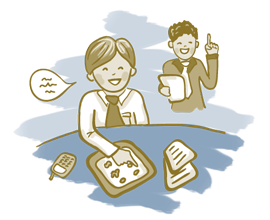A sometimes ignored part of sales strategies is ensuring sales reps have the necessary skill levels to achieve those strategies. The most thought-out and potentially successful strategy in the world will only succeed to the level that salespeople are capable of executing it. Hence the enhancement of sales skill level should be a vital part of sales training.
Technology Won’t Function By Itself
We live in an age of technology. There are many tasks done for us that we previously had to do ourselves—even some thought processes. Despite the futuristic visions of self-thinking computers, however, our best engineers have yet to evolve a computer program that could totally “think on its feet” and execute a complex B2B sale.
Some sales trainers have sought to follow a computing model and evolve highly detailed scripted sales processes that would allow a sales rep to do a minimum of thinking. But in recent years these have been proven unworkable. A salesperson in B2B sales is dealing with a live human being and—even more challenging—a group of live human beings called a company. No script, no matter how well written, can possible take into account the endless variety of issues that can arise during a sales cycle.
Forward-thinking companies today have realized that the only way for a sales force to truly succeed is to be a team composed of skilled experts. This means they are experts on the industry, their own company, its products and, last but not least, selling itself.
The “Leveling Off”
It often happens that a salesperson will go through a training period at a company, after which they reach a certain skill level. This generally is the end of any further sales training efforts by both the salesperson and their managers.
A salesperson has an average closing ratio. These averages, combined, comprise the average closing ratio for the entire sales force. When most or all of the salespeople in a sales force have “leveled off” in their closing ratios, sales figures cannot be increased except by adding more salespeople.
Of course additional salespeople will always be needed, but if the skill and abilities of existing sales reps is also improved—thereby improving the average closing ratio for the whole team—a sales manager is then making the most of all available resources in attaining sales quotas.
Methods of Improving Skills
There are a number of approaches that can be taken to regularly improve sales abilities on a sales force.
The common approach is that of coaching done by sales management. A sales manager will note the sales techniques in which a rep is weak and seek through coaching to improve those.
Another method now being adopted by a number of companies is the sharing of best practices. The more experienced reps share their methods with the remainder of the sales force so they can be utilized by everyone.
General sales training materials and literature can also be imported for sales reps to read (or in the case of video or webinars, watch). In this way the wealth of information available from sales training experts can be regularly studied by the sales force.
Necessity of CRM Solution for an Effective Sales Training
For most of these methods, accuracy is a key factor. For example in coaching, a sales manager may rely on secondhand accounts of other salespeople as regards what one salesperson is “getting wrong.” Or perhaps a salesperson himself or herself may try and figure out, with a sales manager, where they are weak.
With a leading-edge CRM solution, however, guesswork is virtually eliminated. It can be clearly seen at what stage of the sales process a salesperson is losing sales. The data recorded in the right CRM application can also reveal much about where a salesperson needs improvement.
An intuitive CRM solution also makes it possible for sharing of best practices in the one or more stages of the sales process to which they apply. This makes it possible for a sales rep to access those best practices as that stage is reached, at the time they are the most applicable.
And even general training materials can be shared where they apply: to the overall sales process or at its various stages.
Sales strategies only succeed to the skill level of the salespeople involved in their executions. Regularly improve that skill level—and regularly improve your sales strategy success.
Get your free trial of Pipeliner CRM now.




















